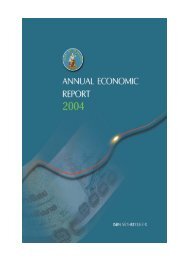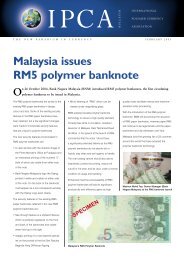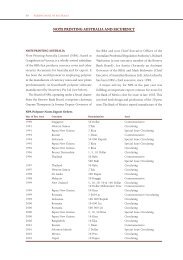ANNUAL REPORT 2008 - Polymer Bank Notes of the World
ANNUAL REPORT 2008 - Polymer Bank Notes of the World
ANNUAL REPORT 2008 - Polymer Bank Notes of the World
You also want an ePaper? Increase the reach of your titles
YUMPU automatically turns print PDFs into web optimized ePapers that Google loves.
Chart 32 Fiscal developments, 1999-2009(as a percentage <strong>of</strong> GDP)gross debt (left-hand scale)deficit (right-hand scale)80570460503403022011001999 2000 2001 2002 2003 2004 2005 2006 2007 <strong>2008</strong> 2009 0Source: European Commission (AMECO database).<strong>Notes</strong>: The euro area average includes 16 countries as <strong>of</strong>1 January 2009; ESA 95 definition; deficit excludes UMTSreceipts.FURTHER FISCAL DETERIORATION EXPECTEDIN 2009The fiscal outlook in euro area countriesis set to deteriorate fur<strong>the</strong>r in 2009.According to <strong>the</strong> interim forecast <strong>of</strong> <strong>the</strong>European Commission, which includes <strong>the</strong>available stability programme updates at <strong>the</strong>end <strong>of</strong> <strong>2008</strong> and <strong>the</strong> beginning <strong>of</strong> 2009, <strong>the</strong>average general government deficit in <strong>the</strong> euroarea is expected to increase by 2.3 percentagepoints to 4.0% <strong>of</strong> GDP (see Chart 32).Government expenditure is set to increase by2.1 percentage points <strong>of</strong> GDP, and revenuesto decrease by 0.1 percentage point <strong>of</strong> GDP.The average government debt ratio in <strong>the</strong>euro area is expected to increase in 2009, by4.0 percentage points, to 72.7% <strong>of</strong> GDP.In all euro area countries except Malta, <strong>the</strong>general government balance is expected todecline, according to <strong>the</strong> Commission’s interimforecast. Ireland, Greece, Spain, France, Italy,Portugal and Slovenia are expected to breachor remain above <strong>the</strong> 3% <strong>of</strong> GDP referencevalue in 2009, in some cases by a wide margin.Deficits in Belgium and Austria are expected tobe at <strong>the</strong> 3% reference value and in Germanyand Slovakia to be just below it. There areclear risks that actual outcomes could be evenworse than expected.FOCUS ON FISCAL SUSTAINABILITY ESSENTIALThe reversal in fiscal outcomes and <strong>the</strong>highly uncertain outlook pose considerablechallenges to fiscal policy in <strong>the</strong> euro area.Public finances are coming under pressurefrom four developments. First, deficits arerising significantly as a result <strong>of</strong> <strong>the</strong> operation<strong>of</strong> automatic stabilisers in <strong>the</strong> macroeconomicslowdown. Second, on top <strong>of</strong> <strong>the</strong> unwinding <strong>of</strong>revenue windfalls <strong>of</strong> recent years, additionalrevenue shortfalls may materialise owing to,among o<strong>the</strong>r factors, sharp falls in financialasset prices, as well as a housing slumpin some countries. Third, <strong>the</strong> governmentinterventions in <strong>the</strong> financial sector to prevent asystemic banking crisis and much more severemacroeconomic disruption carry substantialfiscal risks. Fourth, stimulus measures tocounter <strong>the</strong> economic slowdown put <strong>the</strong> fiscaloutlook under pressure.In this challenging environment, it is crucialthat fiscal discipline and a medium-termperspective are maintained. A preconditionfor maintaining <strong>the</strong> public’s trust in <strong>the</strong>sustainability <strong>of</strong> public finances is to safeguard<strong>the</strong> integrity <strong>of</strong> <strong>the</strong> rules-based EU fiscalframework. It is <strong>the</strong>refore essential that allparties involved adhere to <strong>the</strong>ir commitmentto fully apply <strong>the</strong> provisions <strong>of</strong> <strong>the</strong> Stabilityand Growth Pact, which provide <strong>the</strong> necessaryflexibility to deal with adverse economiccircumstances.The substantial stimulus packages adopted in<strong>2008</strong> and early 2009 add to fiscal imbalances in<strong>the</strong> euro area. To prevent a loss <strong>of</strong> confidence in<strong>the</strong> sustainability <strong>of</strong> public finances, a crediblecommitment to undo stimulus measures as soonas possible is required. In <strong>the</strong> implementation<strong>of</strong> <strong>the</strong> stimulus packages, careful considerationshould be given to <strong>the</strong> quality <strong>of</strong> <strong>the</strong> measuresto ensure <strong>the</strong>ir effectiveness. Determinedefforts in euro area countries to achieveand maintain sound public finances are also76 ECBAnnual Report<strong>2008</strong>




![KNOW YOUR NEW GIBRALTAR BANKNOTES - [Home] bThe/b](https://img.yumpu.com/50890985/1/184x260/know-your-new-gibraltar-banknotes-home-bthe-b.jpg?quality=85)
![PAPUA NEW GUINEA - [Home] - Polymer Bank Notes of the World](https://img.yumpu.com/49758743/1/190x143/papua-new-guinea-home-polymer-bank-notes-of-the-world.jpg?quality=85)










